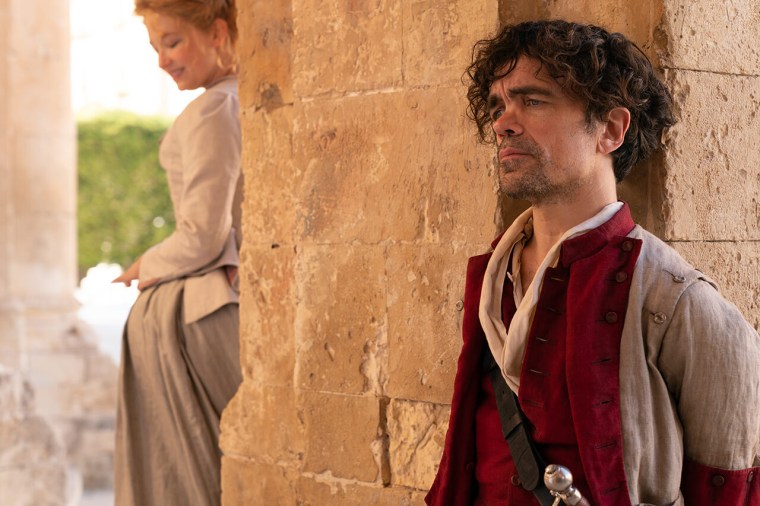Near the beginning of “Cyrano,” a peasant in the background of a market scene casually lifts the woman next to him over his head. They are, unmistakably, ballerinas, despite the 17th-century petticoats and tricorn hats. The crowded scene overflows with period detail, but it somehow is still roomy enough for a little discreet dancing. That’s the moment I knew I loved the movie.
The crowded scene overflows with period detail, but it somehow is still roomy enough for a little discreet dancing. That’s the moment I knew I loved the movie.
Our hero is Cyrano de Bergerac (Peter Dinklage), a gallant and gifted but short-of-stature soldier madly in love with his dearest friend, Roxanne (Haley Bennett, who practically glows). Afraid Roxanne could never love someone like him, Cyrano instead pours his considerable wit into letters he writes for her inarticulate suitor, Christian.
Cyrano is facially disfigured in Edmond Rostand’s original 1897 play — other actors have had prosthetic scars or big putty noses — but the character here is played by the leonine Dinklage, whose dwarfism makes him supposedly unlovable. It’s a brave choice, but also a clever inversion of the classic movie star’s gambit: Like Brad Pitt or Tom Cruise, Dinklage is an actor who takes over a part, rather than vanishing into it. While being instantly recognizable can make you a star in Hollywood, it makes Cyrano an easily recognized target (and heightens his self-loathing).
This is at least the third “Cyrano” movie I’ve seen — counting the Steve Martin comedy “Roxanne.” Director Joe Wright’s version has, by far, the best fight scenes. Cyrano bests his larger opponents with style and skill, fighting off a pack of villainous minions in an alley with his rapier. It’s a terrific scene, and an important one. Roxanne begs Cyrano to go easy on Christian (Kelvin Harrison Jr.) when he joins Cyrano’s regiment. When the two men seem headed for a brawl, Cyrano refuses to hurt the man with whom Roxanne is so thoroughly smitten. But we know Cyrano would have won if he hadn’t been so gallant.
The film feels like a labor of love. Specifically, it seems to be the love of Dinklage’s wife, playwright and director Erica Schmidt, who wrote the screenplay from her own musical adaptation staged several years ago. Dinklage and Bennett starred in that version of the show at the Goodspeed Opera House in Connecticut in 2018; the plaintive songs are by chill rock band The National.
Wright excels at adaptation — I like his “Pride and Prejudice” better than the canonical BBC miniseries, I’m afraid.
But this is also very much a Joe Wright joint. Wright excels at adaptation — I like his “Pride and Prejudice” better than the canonical BBC miniseries, I’m afraid — and his movies always seem hospitable to music. Rhythmic percussion matches the underscoring of typewriter keys in “Atonement”; in “The Woman in the Window,” it can sometimes feel like our unreliable heroine is listening to Danny Elfman’s score alongside us.
Here, finally in full bloom, his characters really sing, something they have been threatening to do for years. Fencing soldiers clack their swords together in metronomic time; Roxanne’s villainous suitor De Guiche (Ben Mendelsohn) sweeps across the screen in a Draculoid cape; dancers twirl together like the shiny cogs of a pricey wristwatch.
The film flirts with silliness — what musical doesn’t? — and cynics may find some scenes too schmaltzy for their hardened hearts. The battlefield finale, where Cyrano and Christian’s fellow soldiers sing about the best moments of their all-too-brief lives, is unashamedly trying to make you cry.
But for those who are open to it, there’s also a lovely invitation in these moments, however romanticized. The much-retold story is nothing if not a tragedy about the perils of closing yourself off to feeling. If we’re willing to be moved, we can find ourselves not just siding with Cyrano but empathizing with him. We know the world can be cruel — that’s not much of a mystery. But like Cyrano, many of us are still trying to escape ourselves long enough to find love.

